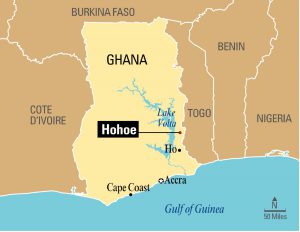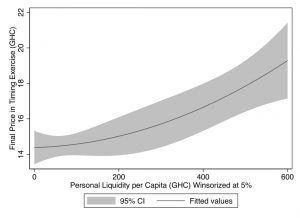This summer I worked alongside Professor Kagy in the Economics Department on a project titled “Poor Bargaining? Theory and Evidence on How and Why Liquidity Affects Price Negotiations.” We worked alongside two other co-authors, Morgan Hardy (NYU – Abu Dhabi) and Lena Song (NYU). Our project, centered in Ghana, looks at the bargaining patterns of garment makers.
In many developing countries, the process of purchasing a garment requires haggling between the seller and the buyer. For the sellers, how they haggle directly affects their income, so the concept of bargaining is very important in developing countries. Classic economic bargaining models only take into account seller cost and buyer value, and we are interested in if a person’s liquidity (availability of liquid assets) affects how they bargain. Our theory is that those with lower liquidity feel more constrained and thus offer lower prices during bargaining because they urgently need the sale.
Our paper consists of a theoretical section in which we model bargaining with an added liquidity constraint, as well as observational evidence of this from our data. We are working with data that Professor Kagy and her co-authors took themselves in January of 2018, in which we surveyed 312 small garment firm owners about their business and personal characteristics. In the survey, we included a bargaining exercise where we asked to purchase a shirt and haggled over the price. From this, we can test the relationship between the final price and the personal liquidity of the garment maker. What we found is a clear positive relationship between liquidity and final price in the bargaining exercise. Those with higher liquidity charge significantly higher prices than those with lower liquidity, which supports our theory that people with higher liquidity feel less constrained.
I have learned so much this summer about the process of designing surveys, conducting research, programming in STATA and Latex, cleaning data, and creating figures for statistical use. I am very grateful for this opportunity and hope to continue conducting research in the future.


